Innovation Takes Center Stage as Manufacturers Launch NAM State of Manufacturing Tour from the Rock & Roll Hall of Fame
CLEVELAND – The National Association of Manufacturers today kicked off its annual NAM State of Manufacturing Tour, a cross-country sprint spotlighting the vital role that manufacturing plays in supporting the nation’s economy. On the first leg of the tour, NAM President and CEO Jay Timmons and other leaders underscored the state’s industrial momentum while calling on our nation’s leaders to pursue a comprehensive manufacturing strategy—building on permanent, pro-growth tax reform manufacturers secured last summer.
“Innovation Built America. Manufacturing Wins the Future” is the theme of this year’s tour, and framed a series of events in Cleveland, bringing together industry leaders, students and policymakers to spotlight Ohio’s nearly 700,000 manufacturing employees—about 12% of the state’s workforce.
“There’s no better place to start a road tour than the Rock & Roll Hall of Fame,” said Timmons, an Ohio native, at the iconic Rock & Roll Hall of Fame, where he delivered his 13th NAM State of Manufacturing Address. “Like rock ‘n’ roll, manufacturing is everywhere. We are hitting the road to showcase the world-leading innovation happening across the country and how we make the next 250 years even greater. Manufacturers are ready to invest—and we need certainty, like the tax bill delivered last year. Permanent tax reform gave manufacturers the rocket fuel. Now we need clear skies. That’s energy dominance, permitting reform, trade certainty, investing in the manufacturing workforce and smart AI policy.
Timmons was joined by Rockwell Automation Chairman and CEO and NAM Board Chair Blake Moret, Cleveland Mayor Justin Bibb, EQT Corporation President and CEO and NAM board member Toby Z. Rice, The Ohio Manufacturers’ Association President Ryan Augsburger and NAM Executive Vice President Erin Streeter. Following the address, Timmons and Moret hosted a student reception at the Hall of Fame, where they engaged with the next generation of creators. The tour then moved to the Rock Hall’s “Jam Garage” for a unique filming opportunity showcasing the intersection of culture and industry. The setting provided a compelling backdrop for discussions about the connection between manufacturing and rock ‘n’ roll—two distinctly American traditions that involve bold ideas, creative risk-taking embracing technological change and the ability to shape global culture.
“The innovation we’ve seen Ohio manufacturers embrace over time is exactly why this tour is so vital,” said Moret. “At Rockwell, we see every day how automation and AI are redefining what’s possible on the factory floor. By visiting places like Cleveland State University and seeing the talent being cultivated here, it’s clear that Ohio manufacturers are moving at the speed of business. Now, we must ensure the federal government keeps up with that pace.”
The afternoon featured an in-depth tour and lunch at EY-Nottingham Spirk Innovation Hub followed by a final stop at Cleveland State University to discuss the critical intersection of higher education and industrial workforce development.
“Ohio’s manufacturers are the backbone of our state’s economy, and having the national tour stop here in Cleveland underscores the importance of our mission,” said Augsburger. “We are proud to stand with the NAM to advocate for the policies that will keep our nearly 700,000 manufacturing workers at the forefront of global competition.”
From Cleveland, the 2026 NAM State of Manufacturing Tour will go on to Philadelphia, Pennsylvania; Charlotte, North Carolina; Milwaukee, Wisconsin; Dallas and Houston, Texas; and Phoenix, Arizona. Throughout the tour, the NAM will continue meeting with policymakers, manufacturers of all sizes, students and business leaders, advocating for the people and policies that will ensure the United States is the best place in the world to do business. To learn more about the tour and the NAM’s mission, visit www.nam.org.
-NAM-
The National Association of Manufacturers is the largest manufacturing association in the United States, representing small and large manufacturers in every industrial sector and in all 50 states. Manufacturing employs nearly 13 million men and women, contributes $2.95 trillion to the U.S. economy annually and accounts for 53% of private-sector research and development. The NAM is the powerful voice of the manufacturing community and the leading advocate for a policy agenda that helps manufacturers compete in the global economy and create jobs across the United States. For more information about the NAM or to follow us on Twitter and Facebook, please visit www.nam.org.
Treasury Clears Path for Greater Manufacturing Investment with Tax Proposal on CAMT
Washington, D.C. – Following the release of a new proposal from the Department of the Treasury reforming key aspects of the Corporate Alternative Minimum Tax guidance and addressing the interaction between the immediate expensing of R&D costs and the CAMT, National Association of Manufacturers Managing Vice President of Policy Charles Crain released the following statement:
“Congress and the Trump administration passed a once-in-a-generation tax law last summer, and now Treasury is building on that win.
“The Corporate Alternative Minimum Tax has threatened manufacturers’ ability to raise wages, hire workers and invest in their communities since it was enacted in 2022. With today’s proposal, Treasury has taken a step toward fixing this fundamentally unworkable regime.
“In particular, the proposed changes to protect H.R. 1’s restoration of immediate expensing for R&D costs will ensure manufacturers are not penalized for their commitment to making investments that drive innovation. Manufacturers conduct 52% of private-sector research—investments that will continue to drive the industry and the economy given that 80% of manufacturers say AI innovation will be essential to grow or maintain their business by 2030.
“The Trump administration is meeting the moment by taking urgent action to supercharge private-sector R&D. Manufacturers called for this critical change, and we thank Treasury for taking this important step to support manufacturing innovation and ensure the continued success of H.R. 1 for our industry.”
-NAM-
The National Association of Manufacturers is the largest manufacturing association in the United States, representing small and large manufacturers in every industrial sector and in all 50 states. Manufacturing employs nearly 13 million men and women, contributes $2.95 trillion to the U.S. economy annually and accounts for 53% of private-sector research and development. The NAM is the powerful voice of the manufacturing community and the leading advocate for a policy agenda that helps manufacturers compete in the global economy and create jobs across the United States. For more information about the NAM or to follow us on Twitter and Facebook, please visit www.nam.org.
ICYMI: NAM’s Charles Crain Testifies Before House Small Business Committee
Washington, D.C. – Today, National Association of Manufacturers Managing Vice President of Policy Charles Crain testified before the House Small Business Committee at its hearing, “Made in the USA: How Main Street Is Revitalizing Domestic Manufacturing.”
In his testimony, Crain thanked the Small Business Committee for its leadership on the recent tax reform package, which made pro-growth, pro-manufacturing tax policy a permanent part of the tax code, giving small and medium-sized manufacturers much-needed certainty. However, by addressing other ongoing challenges, Congress can strengthen and protect the success of H.R. 1.
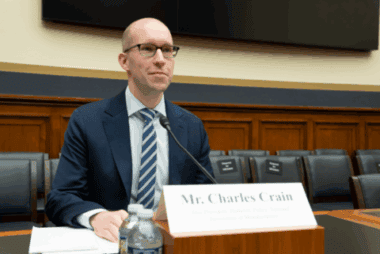
In his opening remarks, Crain outlined the opportunities:
“Congress and the administration can pursue what we’ve called a ‘comprehensive manufacturing strategy.’
- That means rebalancing unworkable regulations and reforming America’s broken permitting process;
- It means investing in our nation’s infrastructure and supporting American energy dominance;
- It means providing trade certainty that empowers manufacturers to make things in America;
- And it means investing in the manufacturing workforce of the future.
“We need all of these policies to build on the success of tax reform, to unlock small manufacturing growth and to drive a true manufacturing renaissance.”
He closed his remarks by encouraging the committee to build on this year’s success:
“This is the road to a manufacturing renaissance. It runs through a comprehensive manufacturing strategy—ensuring that all parts of the federal government are rowing in the same direction: toward an empowered, emboldened, exceptional manufacturing industry.
“Backed by the right policy choices, small manufacturers will deliver—for our communities, for our country and for our preeminence on the world stage.
“Because when manufacturing wins, America wins.”
Read Crain’s full written testimony here.
-NAM-
The National Association of Manufacturers is the largest manufacturing association in the United States, representing small and large manufacturers in every industrial sector and in all 50 states. Manufacturing employs nearly 13 million men and women, contributes $2.90 trillion to the U.S. economy annually and accounts for 53% of private-sector research and development. The NAM is the powerful voice of the manufacturing community and the leading advocate for a policy agenda that helps manufacturers compete in the global economy and create jobs across the United States. For more information about the NAM or to follow us on Twitter and Facebook, please visit www.nam.org.
NAM Taps Industry Veteran Jake Kuhns as Vice President of Domestic Policy
Policy Expert to Drive Food and Beverage, Tax, Health Care, Technology and Immigration Issues for Manufacturers
Washington, D.C. — The National Association of Manufacturers today announced the addition of Jake Kuhns as a vice president of domestic policy at the association. Kuhns, a public policy professional with more than two decades of experience in federal government relations—including shaping policy for Cargill’s food business—will lead the NAM’s work on food and beverage policy, tax, corporate finance, health care, artificial intelligence and technology and immigration.
“Jake brings a wealth of relevant knowledge and experience from his more than 20 years working at the intersection of policy, politics and business, including his work on food and beverage issues that are vital to manufacturers nationwide,” said NAM President and CEO Jay Timmons. “This is a pivotal time for manufacturers as our industry navigates a shifting policy landscape. The landmark tax bill signed into law on July 4 will stimulate investment across manufacturing, but these investments will require a comprehensive manufacturing strategy that builds on our tax win in order to achieve the law’s full pro-growth potential.”
For more than 13 years, Kuhns served as director of federal government relations for Cargill, one of the world’s largest manufacturers of food, beverage and agricultural products. In that role, he led advocacy efforts on food and beverage issues, antitrust and competition, labor and immigration, transportation and tax. He regularly advised Cargill’s senior leadership on the policy and political landscape, managed the company’s political action committee and represented the corporation before Congress, the administration and key federal agencies. His previous experience includes serving as a senior legislative aide to Rep. Tim Holden (D-PA), as well as both association and campaign work.
Timmons added, “Jake is a veteran of our sector and understands the needs of manufacturers. Under his leadership, the NAM will continue to work with Congress and the administration to protect and implement H.R. 1, seize the opportunities presented by artificial intelligence, address the rising costs of health care, support capital formation and good corporate governance, modernize and rebalance federal regulations and ensure that innovators across manufacturing—including biopharmaceutical manufacturers and companies throughout the food and beverage supply chain—can continue to innovate, grow and thrive here in America.
“As manufacturers look to build on recent policy wins and usher in generational change for the sector, we are excited to add Jake to our best-in-class policy team.”
With the recent passage of H.R. 1, Kuhns’ immediate attention will turn to the implementation of the tax package and advancing a comprehensive domestic manufacturing agenda that drives growth, competitiveness and innovation.
Kuhns joins the NAM’s powerhouse external affairs team under the leadership of Executive Vice President Erin Streeter, who oversees the association’s advocacy, policy, government relations and communications efforts. He will report to Managing Vice President Charles Crain, head of the NAM’s policy shop propelling the manufacturing agenda forward, and will work alongside Vice President of International Policy Andrea Durkin, Vice President of Domestic Policy Chris Phalen and Chief Economist Victoria Bloom.
Kuhns is the latest in a wave of 2025 hires across the NAM’s external affairs division, including Senior Director of Tax Policy Connor Rabb, Senior Director of Corporate Finance Policy Ted Allen, Director of Government Relations Sydney Fincher, Director of Health Care Policy Jess Wysocky, Director of Chemicals, Materials and Sustainability Policy Reagan Giesenschlag, Director of International Policy Kevin Doyle, Vice President of Communications and Public Affairs Alexa Lopez, and Director of Strategic Communications Christine Ravold. In addition to adding new talent to the NAM’s team, veteran NAM staff members Jennifer Littlepage and Joseph Murphy have been elevated to vice president of human resources and director of strategic communications, respectively.
-NAM-
The National Association of Manufacturers is the largest manufacturing association in the United States, representing small and large manufacturers in every industrial sector and in all 50 states. Manufacturing employs nearly 13 million men and women, contributes $2.90 trillion to the U.S. economy annually and accounts for 53% of private-sector research and development. The NAM is the powerful voice of the manufacturing community and the leading advocate for a policy agenda that helps manufacturers compete in the global economy and create jobs across the United States. For more information about the NAM or to follow us on Twitter and Facebook, please visit www.nam.org.
ICYMI: Iowa Manufacturers Thank Rep. Mariannette Miller-Meeks for Backing Pro-Growth H.R. 1 on Shop Floor Tour
Washington, D.C.–Iowa manufacturers today rolled out the welcome mat for Rep. Mariannette Miller-Meeks (R-IA-01), thanking her for her support of H.R. 1 during a three-stop shop floor tour as part of the congresswoman’s “Made in America Manufacturing Tour” across Iowa’s 1st Congressional District.
National Association of Manufacturers Executive Vice President Erin Streeter and Iowa Association of Business and Industry President Nicole Crain joined the congresswoman in visiting Cemen Tech, Vermeer and SSAB. Each stop underscored how the manufacturing law is already fueling growth, strengthening competitiveness and creating opportunity in Iowa communities.
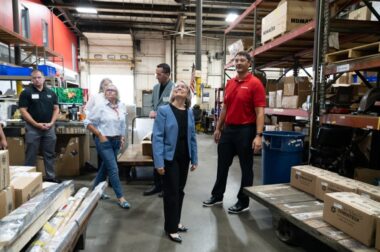
Photo Credit: David Bohrer/National Association of Manufacturers
Crain said, “We appreciate Rep. Miller-Meeks’s longtime support of Iowa manufacturers. From her service in the Iowa Senate to her work in Congress, she has been a consistent advocate for pro-growth tax policies. ABI members thrive on certainty, and this legislation gives Iowa businesses the stability they need to reinvest in their people and their operations.”
In Indianola, Rep. Miller-Meeks toured employee-owned Cemen Tech, the world’s largest manufacturer of volumetric concrete mixing systems.
Cemen Tech Director of Supply Chain Brant Pfantz thanked Rep. Miller-Meeks for her support. “We are so grateful to Rep. Miller-Meeks for voting for pro-growth tax reform. It’s not just about giving manufacturers like us certainty but giving our contractors—builders and developers—the certainty to plan for their next projects so we can all build and scale together.”
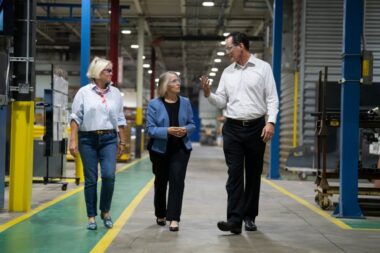
Photo Credit: David Bohrer/National Association of Manufacturers
The second stop, at industrial and agricultural equipment producer Vermeer Corporation, demonstrated how provisions like renewing the research and development deduction in the tax package will help manufacturers maintain their competitiveness.
Vermeer President and CEO Jason Andringa said, “The Big Beautiful Bill will allow us to continue to deduct expenses related to research and development. This is critical if manufacturers are going to continue to push the edge and innovate. This bill sets up manufacturers for a generation of continued growth and advancement.”
Global steel manufacturer SSAB hosted the final stop on the tour. SSAB Americas President Chuck Schmitt reiterated how important H.R. 1 is to the U.S. manufacturing economy. “The One Big Beautiful Bill Act will act as a growth catalyst for manufacturing in America. By driving investment, strengthening supply chains and ensuring our workforce has the tools and training to succeed, this law will help SSAB meet growing demand with the most sustainably produced American-made steel. We thank Congresswoman Miller-Meeks for her continued leadership on policies that support jobs, improve competitiveness and strengthen our nation’s economy.”
-NAM-
Manufacturers Host Lawmakers, Celebrate Tax Reform Victory

Manufacturers in Pennsylvania and New Jersey welcomed Republican representatives to their facilities this week, thanking them for delivering a landmark victory for manufacturers: the passage of H.R. 1.
- House Republican Conference Chairwoman Lisa McClain (R-MI) and local Reps. Tom Kean (R-NJ-7), Rob Bresnahan (R-PA-8) and Ryan Mackenzie (R-PA-7) participated in the factory tours as part of Chairwoman McClain’s One Big Beautiful Tour.
NAM in action: NAM Executive Vice President Erin Streeter accompanied lawmakers, highlighting how the Manufacturing Law is already having positive impacts on local manufacturing.
- “Manufacturing is the backbone of the American economy—and with the leadership of Chairwoman McClain, Reps. Kean, Bresnahan, Mackenzie and their colleagues in Congress—that foundation is stronger than ever,” Streeter said following the visits.
- “By championing the Manufacturing Law, Congress has protected nearly 6 million jobs and more than $500 billion in wages for hardworking Americans. We thank them for their leadership.”
New Jersey: Chairwoman McClain and Rep. Kean toured Bihler of America , a manufacturer of precision automation systems in Phillipsburg, New Jersey. The company specializes in complex metal stamping, forming and assembly solutions, serving industries such as automotive, medical and consumer products.
- “Manufacturers thrive when we have the certainty we need to plan major investments in our facilities and our people. That’s exactly what this tax package delivers,” said Bihler CEO Maxine Nordmeyer.
- “We thank our partners in Congress and the administration—and we look forward to working with them on a full comprehensive manufacturing strategy. Through energy, trade and workforce policies that drive our competitiveness, deliver certainty and empower manufacturers, we will build on the success of the One Big Beautiful Bill.”
Pennsylvania: Rep. Bresnahan joined Chairwoman McClain for a tour of i2M , a manufacturer of flexible polymers in Mountain Top, Pennsylvania. The company produces custom polymer films and sheets used in a variety of applications, including agriculture, construction, packaging and geomembranes.
- “Manufacturers are innovators. By restoring immediate R&D expensing for manufacturers across America [a key provision of the OBBBA], Congress has empowered manufacturers like i2M to innovate and create,” said i2M Founder Chris Hackett.
- “That’s how we keep our competitive edge—not just as a company, but as a country.”
Pennsylvania, round 2: At another stop in the Keystone State, Rep. Mackenzie joined the tour at U.S. Metal Powders in Palmerton. The visit highlighted the company’s recent expansion, including a new state-of-the-art production line that will create new jobs and boost aluminum powder output for global markets.
- “Thanks to this transformative tax legislation, U.S. Metal Powders has already broken ground on adding another production line—which will soon double the company’s workforce. This is pro-growth tax policy in action,” Pennsylvania Manufacturers’ Association President and CEO David N. Taylor said in response to the visit.
NAM in the news: The White House’s rapid response account on X highlighted Rep. Bresnahan’s visit to Pennsylvania and appearance on the area’s local Fox affiliate.
- Fox Business Network’s Maria Bartiromo cited the NAM’s partnership on the tour in an interview with Chairwoman McClain.
- The House GOP X account shared a video of Streeter talking about the facility visits.
- Chairwoman McClain posted about her visits to Bihler of America, i2M and U.S. Metal Powders on X. Chairwoman McClain, along with Reps. Bresnahan and Kean, also amplified the NAM’s own social posts.
- WVIA covered the visit to i2M.
ICYMI: Manufacturers Thank Chairwoman McClain and Area Members of Congress for Their Votes on H.R. 1 During Shop Floor Visits
Washington, D.C. – Manufacturers rolled out the welcome mat this week for House Republican Conference Chairwoman Lisa McClain (R-MI) and local Reps. Tom Kean (R-NJ-7), Rob Bresnahan (R-PA-8) and Ryan Mackenzie (R-PA-7), thanking them for their support for the One Big Beautiful Bill Act during a series of factory tours as part of Chairwoman McClain’s One Big Beautiful Tour.
National Association of Manufacturers Executive Vice President Erin Streeter hit the road with lawmakers, showcasing how the Manufacturing Law is already having positive impacts on local manufacturing.
Speaking for manufacturers nationwide, Streeter reiterated the significance of the tax package on the industry: “Manufacturing is the backbone of the American economy—and with the leadership of Chairwoman McClain, Reps. Kean, Bresnahan, Mackenzie and their colleagues in Congress—that foundation is stronger than ever. By championing the Manufacturing Law, Congress has protected nearly 6 million jobs and more than $500 billion in wages for hardworking Americans. We thank them for their leadership.”
In New Jersey, Chairwoman McClain and Rep. Kean toured Bihler of America, a manufacturer of precision automation systems in Phillipsburg.
Bihler CEO Maxine Nordmeyer expressed her appreciation for Congress’ action on tax policy: “Manufacturers thrive when we have the certainty we need to plan major investments in our facilities and our people. That’s exactly what this tax package delivers. We thank our partners in Congress and the administration—and we look forward to working with them on a full comprehensive manufacturing strategy. Through energy, trade and workforce policies that drive our competitiveness, deliver certainty and empower manufacturers, we will build on the success of the One Big Beautiful Bill.”

In Pennsylvania, Rep. Bresnahan joined Chairwoman McClain for a tour of i2M, a manufacturer of flexible polymers in Mountain Top. i2M Founder Chris Hackett conveyed how a key provision of the tax package will help businesses like his continue to succeed: “Manufacturers are innovators. By restoring immediate R&D expensing for manufacturers across America, Congress has empowered manufacturers like i2M to innovate and create. That’s how we keep our competitive edge—not just as a company, but as a country.”
At another stop in the Keystone State, Rep. Mackenzie joined the tour at U.S. Metal Powders in Palmerton. Pennsylvania Manufacturers’ Association President and CEO David N. Taylor thanked Chairwoman McClain and Rep. Mackenzie: “Thanks to this transformative tax legislation, U.S. Metal Powders has already broken ground on adding another production line—which will soon double the company’s workforce. This is pro-growth tax policy in action.”
-NAM-
Whip Emmer Applauds Innovation at Niron Magnetics

House Majority Whip Tom Emmer (R-MN) recently toured Niron Magnetics’ headquarters in Minneapolis, Minnesota, where he met with company leaders and employees to discuss the future of domestic manufacturing, alternatives to rare earth magnets (a manufacturing input largely controlled by China) and pro-growth tax policy.
Pioneering technology: Niron Magnetics is developing the world’s only high-performance permanent magnets made entirely without rare earth elements.
- The company’s iron nitride–based magnets are poised to revolutionize industries that depend on magnetic technologies—from electric vehicles and wind turbines to consumer electronics and defense systems—while sharply reducing U.S. dependence on China.
- Founded thanks to a Department of Energy ARPA-E REACT grant in 2011, Niron recently completed a two-year SCALEUP pilot project and is now preparing for commercial expansion.
- “Our goal is to build a fully domestic, globally competitive magnet supply chain that strengthens U.S. energy security, supports national defense and creates [well]-paying jobs,” said Niron Magnetics CEO Jonathan Rowntree. “We’re proud to lead this next chapter in American manufacturing.
The visit: Company officials briefed Whip Emmer on their ongoing collaborations with the Departments of Energy and Defense, emphasizing the national security and energy innovation implications of their work.
- While touring the facility, Whip Emmer engaged with engineers and employees—and even hand-pressed one of Niron’s next-generation magnets.
A big announcement: During the visit, Niron shared plans to break ground on a new 168,000-square-foot manufacturing facility in Sartell, Minnesota, this fall.
- The facility, which will be the world’s first large-scale manufacturer of rare earth–free iron nitride permanent magnets, is expected to create 175 new jobs when it opens in early 2027.
Policy support matters: Whip Emmer, who played a pivotal role in the passage of the One Big Beautiful Bill Act—now signed into law—reiterated his commitment to advancing policies that empower manufacturers to innovate and grow.
- “American manufacturers like Niron are leading the way in rebuilding critical supply chains and securing our industrial future,” Whip Emmer said. “Now that the One Big Beautiful Bill Act is law, we’ve delivered the tools to help U.S. innovators grow, compete with China and protect our national and economic security.”
Securing supply chains: The visit also spotlighted the broader imperative of reducing U.S. reliance on foreign countries—particularly China—for critical minerals. The NAM has consistently advocated federal policies that support domestic sourcing, refining and processing of critical and rare earth materials to ensure secure, resilient supply chains.
- “America’s overdependence on geopolitical rivals for essential materials is one of the greatest threats to our economic and national security,” said NAM Managing Vice President of Policy Charles Crain. “We need strategic investments and permitting reforms that allow companies like Niron to scale breakthrough technologies here at home—and do it quickly.”
- “Meanwhile, outdated and inconsistent permitting delays hamper companies like Niron from bringing transformative technologies to market swiftly and at scale.”
- “Policymakers have an urgent choice to make,” Crain added. “Either we modernize our permitting system and invest in domestic production—or we continue to cede critical supply chains to our competitors. The stakes couldn’t be higher.”
Manufacturers Thank Legislators for Landmark Tax Legislation

Two manufacturing leaders testified at House Ways and Means Committee field hearings in Nevada and California this past weekend.
- Click Bond Director of Manufacturing Austin Robinson testified on Friday in Las Vegas, focusing on the impacts of the One Big Beautiful Bill’s tax provisions for the manufacturing workforce.
- On Saturday, Robinson Helicopter Company Vice President of Business Development Will Fulton testified alongside NAM President and CEO Jay Timmons at the Ronald Reagan Presidential Library, where they discussed the impacts of the tax provisions for manufacturers. (In case you missed it, here is our article from yesterday on Timmons’ testimony.).
Click Bond: Austin has spent his career in manufacturing. He now manages the 80% of employees who make up the manufacturing workforce at Click Bond, which designs, manufactures and supports adhesive bonded fasteners that are used in space, aviation, marine and other applications, both civil and defense.
- After Austin thanked policymakers for passing the One Big Beautiful Bill Act, he explained what it means for his company. “2017 tax reform was tremendously impactful for both our business and our workers,” he said. “It allowed us to increase wages, scale up our engineering and development workforce, invest in next-generation equipment and create a new employee academic assistance program.”
- “[By] making permanent a pro-growth tax code, the One Big Beautiful Bill will empower us to continue and expand these investments, to purchase more equipment and conduct more research and to further increase pay and benefits for our employees.”
Investing in workers: Austin emphasized that the bill will allow manufacturers to keep investing in workers, building on the pay increases Click Bond was able to provide to their hourly employees following the Tax Cuts and Jobs Act.
- “My first employer paid for my education, and I am proud to say that Click Bond does the same for any employees who want to go back to school and develop their skill,” he said. “Our workforce at Click Bond is the most precious resource, and that is reflected in the investments that we make in them. Those investments are actually enabled by a pro-growth tax policy.”
Robinson Helicopter: Will also thanked policymakers for this legislation.
- Robinson “specializes in helicopter design, assembly, inspection, flight testing, manufacturing and production. … Our Torrance, California, manufacturing facility is the world’s leading commercial helicopter manufacturer, period,” he told policymakers.
- “The One Big Beautiful Bill Act supports [Robinson] by driving our ability to accelerate domestic investment expansion and growth. … This legislation helps accelerate our ambitions into a more near-term reality.”
R&D support: “These tax provisions help us to invest both in the design of new technology and its production processes,” Will added. “We recently launched our newest helicopter, the R88, which offers more robust first responder capabilities.”
- “Our R&D efforts for the R88 include the ability to fit that helicopter with more advanced technology and equipment for firefighting, disaster response and emergency medical services. That helicopter will act as an operational control center to a fleet of fire surveillance drones to better scan for any signs of ignition, ensure faster response times and expand the capacity of fire departments to contain fires earlier.”
- “Thanks to your leadership, Congress and the administration have empowered Robinson Helicopter to create jobs, invest in equipment, innovate through R&D and drive economic growth faster,” he concluded.
ICYMI: One Big Beautiful Bill in Action: House Ways and Means Hears from Manufacturers
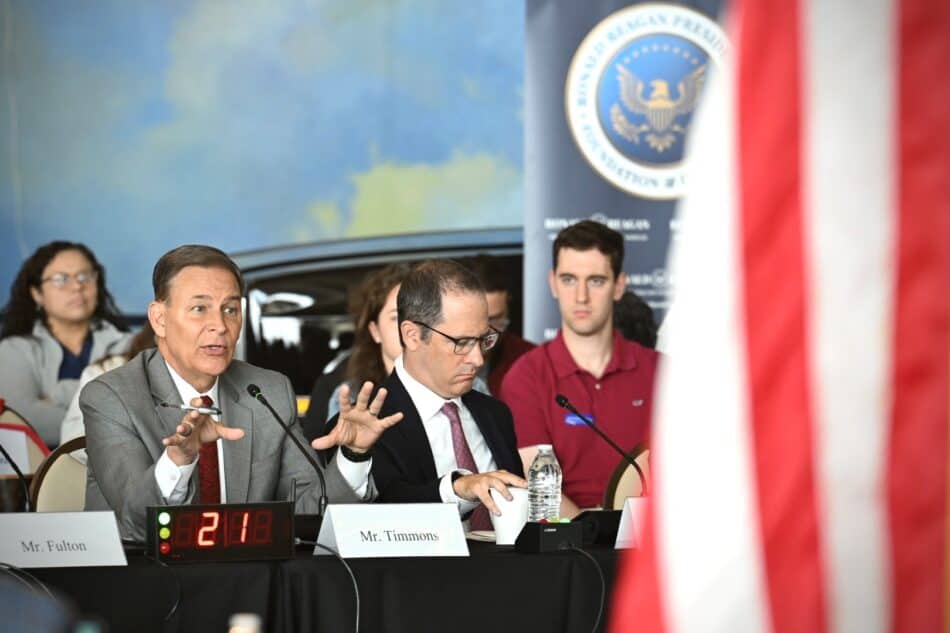
Watch Jay Timmons’ House Ways and Means Testimony
Over the course of two days, manufacturers praised the pro-growth tax provisions of the One Big Beautiful Bill Act during field hearings hosted by the House Ways and Means Committee. On Friday, Click Bond Director of Manufacturing Austin Robinson testified in Las Vegas, Nevada. On Saturday, National Association of Manufacturers President and CEO Jay Timmons and Robinson Helicopter Company Vice President of Business Development William Fulton testified at the Ronald Reagan Presidential Library in Simi Valley, California. Timmons also joined NewsNation ahead of the hearing to discuss the passage of historic tax legislation.
NAM’s Timmons: Manufacturing Law Will Help to Drive Another American Century
“This is a manufacturers’ law, through and through. By making immediate R&D expensing, full expensing of capital equipment and interest deductibility permanent, this Manufacturing Law delivers for investment and innovation.
…
“Through the pass-through deduction, reduced individual tax rates and estate tax protections for family-owned businesses, this Manufacturing Law delivers for the small businesses that power our economy.
…
“Through protecting the 21% corporate tax rate—and through strengthening the international tax system that incentivizes companies to invest here, build here [and] hire here—this Manufacturing Law will help to deliver another American century.”
Robinson Helicopter: OBBBA Accelerates Domestic Investment, Expansion and Growth
“Many of our employees come from families who have worked at Robinson Helicopter across multiple generations, and we are proud of the work we do, which the One Big Beautiful Bill Act supports by driving our ability to accelerate domestic investment, expansion and growth.
….
“The One Big Beautiful Bill retained a 21% corporate tax rate that underpins the baseline for our global competitiveness, and included critical provisions to reduce the cost of investment that will facilitate our product and job growth plans. Manufacturers are innovators, and one of the most important provisions of H.R. 1 is the restoration of immediate R&D expensing. Though manufacturing accounts for only 10% of the country’s GDP, we make up 53% of all private-sector research spending. These tax provisions help us to invest both in the design of new technology and its production processes.
…
“Thanks to your leadership, Congress and the administration have empowered Robinson Helicopter to create jobs, invest in equipment, innovate through R&D and drive economic growth faster.”
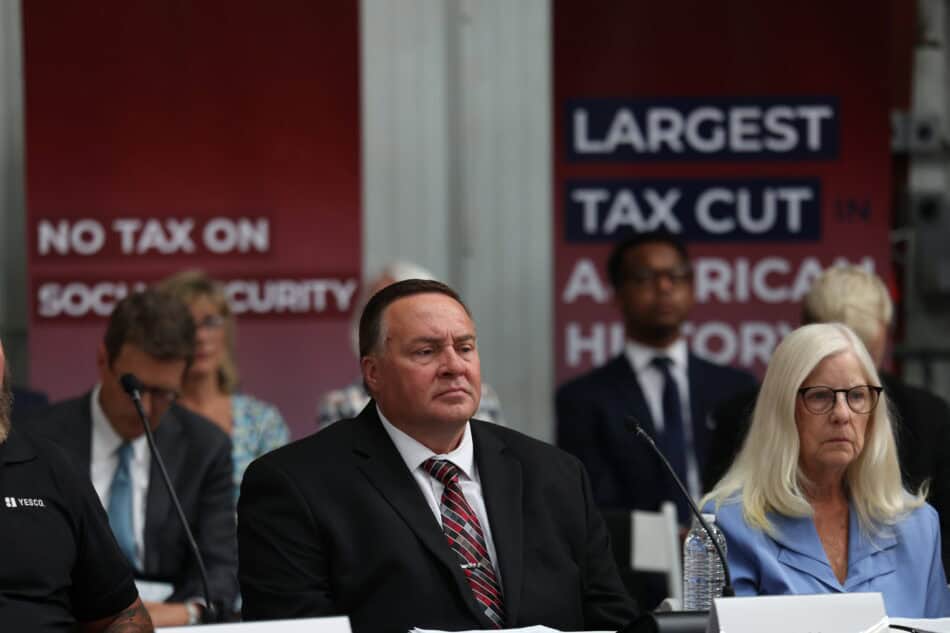
Click Bond: OBBBA Bolsters Family-Supporting Careers
“The One Big Beautiful Bill’s impacts on manufacturing workers [are] substantial. It protects them from tax hikes, provides further cuts via no tax on overtime and frees up capital for businesses like Click Bond to hire more workers [and] increase wages and benefits. By recognizing the importance of innovation, investment and workers, this bill gives manufacturers in Nevada and across the country the tools they need to succeed and grow. This means more jobs and higher wages and more lifelong family-supporting careers for manufacturing workers across this great country.”

NAM’s Timmons: Tax Law Is a Once-in-a-Lifetime Investment
“Manufacturers have been given an incredible opportunity with this tax law … I think this is once in the lifetime of the country that we’ve seen something that is this competition-focused—allowing us to attract investment to our shores. So Chairman Jason Smith … he understands that when you create the economic conditions, then businesses, and specifically manufacturers in our case, can help provide opportunities to folks all across this country … So we’re pretty excited about the ability to do that, and we’ve been given the tools to do that, and I can assure you that manufacturers will live up to that promise.”
-NAM-
The National Association of Manufacturers is the largest manufacturing association in the United States, representing small and large manufacturers in every industrial sector and in all 50 states. Manufacturing employs nearly 13 million men and women, contributes $2.90 trillion to the U.S. economy annually and accounts for 53% of private-sector research and development. The NAM is the powerful voice of the manufacturing community and the leading advocate for a policy agenda that helps manufacturers compete in the global economy and create jobs across the United States. For more information about the NAM or to follow us on Twitter and Facebook, please visit www.nam.org.
